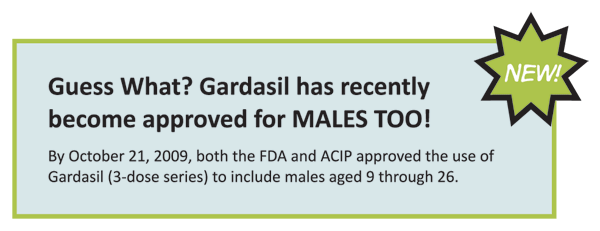VACCINES
Some STDs can be prevented if you get the vaccine before being exposed to the specific STD it’s intended to prevent. There are currently two forms of Hepatitis and some strains of Human Papillomavirus (HPV) that can be prevented through vaccinnes.
All the vaccines are effective, but because they don’t protect against all STDs or pregnancy, you should use latex or polyurethane condoms consistently and correctly and limit the number of sex partners you have.
HEPATITIS
Available Hepatitis Vaccines:
Hepatitis A (HAV) – The HAV vaccine is given as 2 shots for anyone over the age of one. It is effective and safe. Protection begins about two weeks after the first shot is given and long-term protection happens after the second shot. No serious side effects are linked to the vaccine, but people often report some soreness where the shot was given.
The HAV vaccine is recommended for a wide range of people, including (but not limited to):
- children (from age 1 year);
- anyone who is sexually active;
- injection drug users;
- anyone with chronic (lifelong) liver diseases including Hepatitis B or Hepatitis C;
- food handlers or food service workers.
Hepatitis B (HBV) – The HBV vaccine is given as 3 shots over a 6 month period of time. The vaccine may be given as early as birth for a newborn baby. Like the HAV vaccine, the HBV vaccine is considered both effective and safe. After three doses (shots), the vaccine provides a protection rate greater than 90% when exposed to the virus. Serious side effects are uncommon and when they do occur, are considered far less severe than the health risks posed by an actual HBV infection.
The HBV vaccine is recommended for all infants, older children, and teens who haven’t been previously vaccinated. Additionally, anyone who falls into a particular risk group should be vaccinated.
Some of these risk groups include (but aren’t limited to) people who:
- have sex partners that have HBV;
- are not in mutually monogamous sexual relationships;
- are engaging in unprotected sex;
- are concerned they may have gotten an STD;
- share injection drug equipment;
- have close household contact with someone infected with HBV;
- anyone with chronic (lifelong) liver disease, including hepatitis C.
HPV
Available HPV Vaccine:
There is only one vaccine currently approved by the Food and Drug Administration (FDA) to protect against HPV. The vaccine, named Gardasil, is 3 shots given over a 6 month time period. This vaccine is now available to females and males aged 9-26.
The vaccine can prevent 70% of cervical cancers and 90% of genital warts caused by four particular strains of HPV. The vaccine protects best when given before becoming sexually active.

Check with your healthcare provider to see if Gardasil is right for you. To learn more about the new recommendations: CDC, FDA, ACIP, Merck.
GETTING YOUR VACCINES
If you have a regular healthcare provider, talk to them about the vaccines discussed here. If you don’t have a regular healthcare provider, you can go to the clinic finder on this site to find a doctor or nurse who can provide healthcare and advice.
You may be able to receive free vaccines through the Federal Vaccines for Children (VFC) Program, if you are:
- Under age 19
- Medicaid eligible
- American Indian or Alaska Native
- Uninsured
- Underinsured for vaccines (if your current health insurance doesn’t cover the HPV vaccine)
To learn about other help in paying for the vaccine, visit Merck and check out their patient assistance program.





